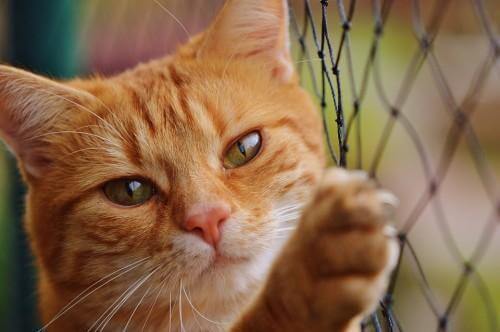
Many people are aware that heartworms are a serious and potentially life-threatening parasite prevalent in North Carolina. However, most people are not aware that heartworms can affect their cats almost as frequently as their canine companions. Furthermore, just because your kitty lives exclusively indoors does not mean they are safe from the threat of heartworm disease. In fact, 1-in-4 cases of heartworms diagnosed in cats occur in indoor-only kitties. What are heartworms? Heartworms are parasites that can live in the heart, lungs, and blood vessels of infected pets potentially causing serious cardiovascular (heart and lung) disease. Baby heartworms (or larvae) are transmitted to our pets through mosquito bites. The immature or baby worms then travel through the pet’s system until they reach the heart and lungs where they mature into FOOT LONG adult worms. Heartworms can cause severe (and, in some cases, irreversible) damage to the lungs, heart, and blood vessels resulting in breathing problems, heart failure, and even death. While heartworms are most commonly considered a problem in dogs, heartworms can affect many species including cats, ferrets, wolves, coyotes, foxes, sea lions, and more. While cats are considered an atypical host for heartworms and most heartworms do not survive to the adult stage, even ONE immature heartworm can permanently affect your cat’s health. A single, immature heartworm can result in a chronic inflammatory reaction in the feline respiratory system (commonly called “HARD”, or Heartworm Associated Respiratory Disease), resulting in chronic, irreversible breathing problems. Furthermore, if adult heartworm does survive in your cat, it has an average life span of 2-4 years during which they are doing continual damage to your cat’s heart and lungs. The American Heartworm Association reports that currently, only 5% of cats receive heartworm prevention. Research on feline heartworm disease has shown that cats contract heartworms almost as frequently as dogs. However, feline heartworm disease is significantly more difficult to treat and currently, there are NO approved medications to treat heartworm disease in cats. This means that if your cat contracts heartworm disease; this life-threatening condition can be managed (with a lifetime of medications), but not cured in your feline friend. What can I do to protect my cat? The good news is that we have easy and effective medications to PREVENT heartworms in your cat. Revolution is an easy monthly treatment that is applied to the skin on the back of your cat’s neck and provides 4 weeks of protection against heartworms, fleas, and some common intestinal parasites. Not all topical medications contain a heartworm preventative so make sure to discuss preventative options with your veterinarian at the Animal Hospital at Lake Brandt. Monthly, year-round prevention is KEY to ensuring that your feline friend has a life free of heartworms and heartworm related breathing problems. April is a preventative month at the Animal Hospital at Lake Brandt. Stop by to check out our promotions on heartworm, flea, and tick prevention for both your feline and canine family members.

